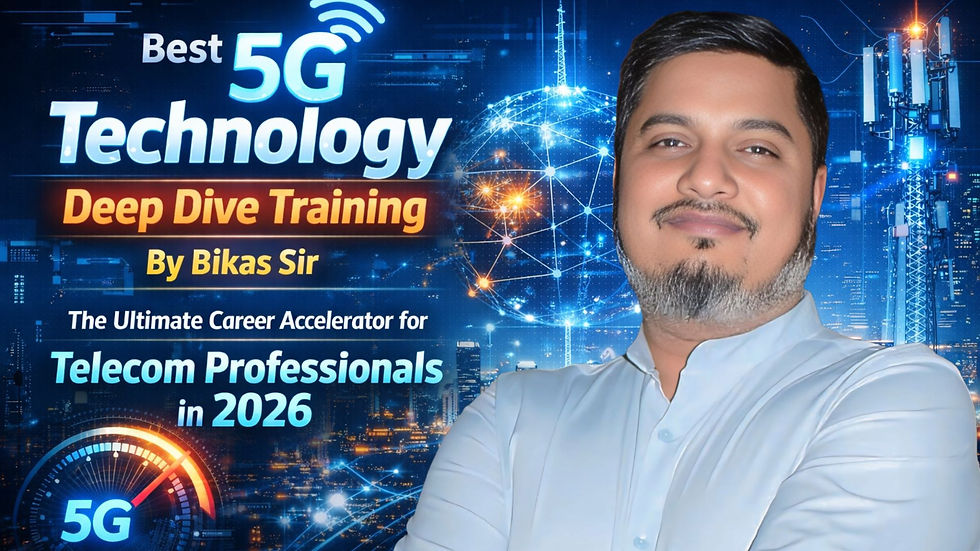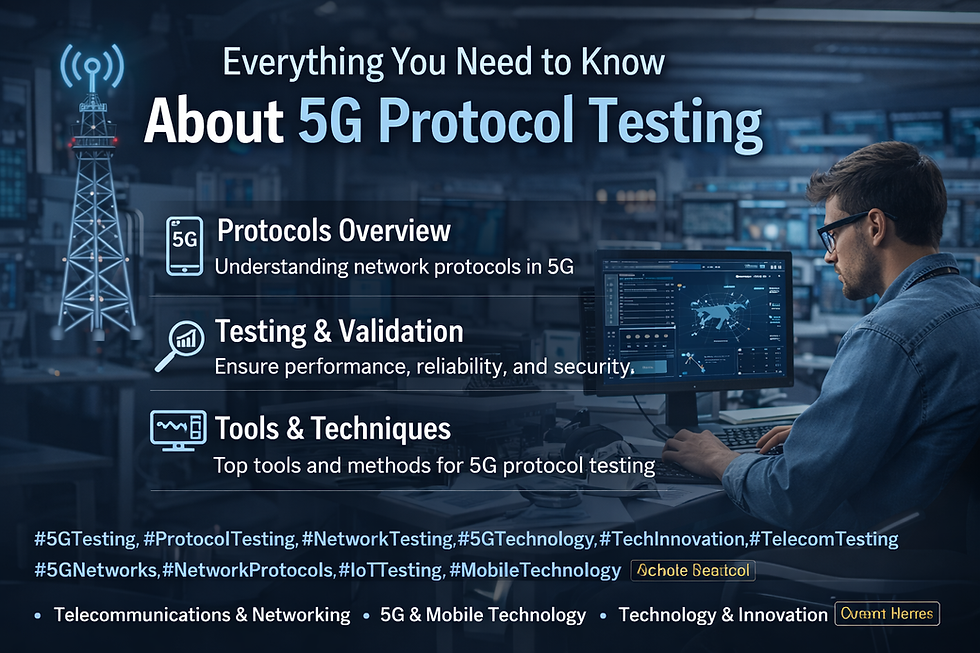The Intersection of 5G Telco Cloud and Blockchain Technology in 2024
- Sameer Krishn
- Jun 24, 2024
- 5 min read
Updated: Jun 28, 2024

Introduction
The convergence of 5G Telco Cloud and blockchain technology represents a significant evolution in the digital landscape. Both technologies offer transformative potential individually, but their combination opens new avenues for innovation across multiple sectors. This blog explores the intersection of 5G Telco Cloud and blockchain technology, detailing their impact, benefits, challenges, and future trends for 2024 and beyond.
Table of Contents
Understanding 5G Telco Cloud
Overview of Blockchain Technology
Benefits of Combining 5G Telco Cloud and Blockchain
Real-World Applications
Challenges and Considerations
Future Trends and Predictions
Conclusion
Understanding 5G Telco Cloud
What is 5G Telco Cloud?
5G Telco Cloud integrates the high-speed, low-latency capabilities of 5G networks with the scalability and flexibility of cloud computing. This combination facilitates efficient data management and seamless connectivity, crucial for modern digital applications.
Importance for Modern Networks
5G Telco Cloud underpins the next generation of digital infrastructure, enabling faster data transmission, improved network reliability, and the ability to support a massive number of connected devices. This makes it essential for applications like IoT, autonomous vehicles, and smart cities.
Overview of Blockchain Technology
What is Blockchain?
At its core, blockchain is a series of immutable records of data managed by a cluster of computers not owned by any single entity. Each of these blocks of data is secured and bound to each other using cryptographic principles, forming a chain. This decentralized structure means that no single party has control over the entire blockchain, which significantly reduces the risk of fraud or manipulation.
Key Features of Blockchain
Decentralization: Unlike traditional databases, blockchain does not have a central authority. Instead, data is distributed across a network of computers, known as nodes. This decentralization ensures that the data is not stored in a single location, making it more secure and less vulnerable to attacks.
Transparency: All transactions on a blockchain are visible to all participants in the network. This transparency fosters trust among users, as they can independently verify and audit transactions.
Immutability: Once data has been recorded on a blockchain, it cannot be altered or deleted. This immutability is achieved through cryptographic hashing, which links each block to the previous one. Any attempt to alter a block would require changing all subsequent blocks, which is practically impossible.
Security: Blockchain uses advanced cryptographic techniques to secure data. Each transaction is encrypted and linked to the previous transaction, making it highly secure and resistant to tampering.
Benefits of Combining 5G Telco Cloud and Blockchain
The integration of 5G Telco Cloud and blockchain technology is poised to bring unprecedented benefits across multiple sectors. This combination leverages the strengths of both technologies, enhancing security, efficiency, and scalability.
Enhanced Security and Privacy
One of the most significant benefits of combining 5G Telco Cloud and blockchain is the enhancement of security and privacy. Blockchain’s decentralized and immutable nature ensures that data remains secure and tamper-proof. When combined with the high-speed, low-latency capabilities of 5G, this creates a robust framework for secure data transmission and storage.
Data Integrity: Blockchain ensures that once data is recorded, it cannot be altered, providing a reliable audit trail. This is crucial for industries like finance and healthcare, where data integrity is paramount.
Encryption: 5G networks offer advanced encryption methods, protecting data during transmission. Combined with blockchain, this provides a dual layer of security, safeguarding data from end to end.
Improved Data Management
The synergy between 5G Telco Cloud and blockchain results in more efficient data management. Blockchain’s ability to provide transparent and immutable records complements 5G’s real-time data processing capabilities.
Real-Time Processing: 5G’s low latency enables real-time data processing, which is essential for applications like autonomous vehicles and smart cities. Blockchain ensures that the data being processed is accurate and tamper-proof.
Scalability: 5G Telco Cloud can handle a massive amount of data, supporting the scalability required for growing IoT ecosystems. Blockchain provides a secure way to manage and verify this data.
Operational Efficiency and Cost Reduction
Combining these technologies can significantly improve operational efficiency and reduce costs. The speed and reliability of 5G, paired with blockchain’s secure transaction processing, streamline various business operations.
Automated Processes: Smart contracts on the blockchain can automate complex processes, reducing the need for intermediaries and minimizing human error. This is particularly beneficial in supply chain management and financial transactions.
Cost Savings: By eliminating intermediaries and reducing the risk of fraud, businesses can save on transaction costs and improve their bottom line.
Enhanced Connectivity and Speed
The integration of 5G and blockchain facilitates enhanced connectivity and speed. 5G’s high-speed connectivity ensures that blockchain transactions can be processed quickly and efficiently, supporting real-time applications.
IoT Connectivity: 5G enables seamless connectivity for a vast number of IoT devices. Blockchain provides a secure way to manage the data generated by these devices, ensuring data integrity and security.
Real-Time Analytics: The combination of 5G’s speed and blockchain’s secure data management allows for real-time analytics, enabling businesses to make informed decisions quickly.
Real-World Applications
Supply Chain Management
The combination of 5G Telco Cloud and blockchain revolutionizes supply chain management by providing real-time tracking, transparent transactions, and enhanced security. Companies can monitor their supply chains more effectively, ensuring product authenticity and reducing fraud.
Healthcare
In healthcare, these technologies enable secure and efficient data sharing among providers, patients, and insurers. Blockchain ensures data integrity and patient privacy, while 5G facilitates real-time data access and remote healthcare services.
Financial Services
The financial sector benefits from improved transaction speeds, reduced costs, and enhanced security. Blockchain’s decentralized ledger provides transparency and trust, while 5G enables instant transaction processing and verification.
Challenges and Considerations
Technical Integration
Integrating 5G Telco Cloud and blockchain technology involves significant technical challenges. Ensuring compatibility between different systems and managing the complexities of decentralized networks require advanced technical expertise and robust infrastructure.
Regulatory and Compliance Issues
The adoption of these technologies is subject to various regulatory and compliance issues. Different jurisdictions have different regulations regarding data privacy, security, and financial transactions, which can complicate the deployment of integrated solutions.
Cost and Investment
Implementing 5G Telco Cloud and blockchain solutions requires substantial investment in infrastructure, technology, and training. Organizations must weigh these costs against the potential benefits and return on investment.
Future Trends and Predictions
Expansion of IoT
The integration of 5G Telco Cloud and blockchain will drive the expansion of IoT ecosystems. More devices will be connected, creating vast networks of interconnected systems that can operate autonomously and securely.
Development of Smart Cities
These technologies will play a pivotal role in the development of smart cities, enabling efficient and secure management of urban infrastructure, energy, transportation, and public services.
Advancements in AI and Machine Learning
The synergy between 5G Telco Cloud and blockchain will also accelerate advancements in AI and machine learning. These technologies can leverage the secure, real-time data provided by the integrated systems to develop more intelligent and responsive applications.
Conclusion
The intersection of 5G Telco Cloud and blockchain technology represents a transformative shift in the digital landscape. By combining the strengths of both technologies, businesses and industries can achieve enhanced security, efficiency, and scalability. As we move into 2024 and beyond, the continued evolution of these technologies will unlock new possibilities for innovation and growth.
For those looking to stay ahead in this dynamic field, Apeksha Telecom offers comprehensive training programs with 100% placement assistance. Our courses are designed to equip students with the skills and knowledge needed to thrive in the rapidly evolving world of 5G and blockchain technology.
Internal URLs:
Apeksha Telecom's training programs: https://www.apekshatelecom.com/training
Apeksha Telecom's placement assistance: https://www.apekshatelecom.com/placement-assistance
External URLs:
Telecom Gurukul: https://www.telecomgurukul.com
Reference URLs:
"The Intersection of 5G Telco Cloud and Blockchain Technology" - Apeksha Telecom: https://www.telecomgurukul.com/post/the-intersection-of-5g-telco-cloud-and-blockchain-technology




Comments